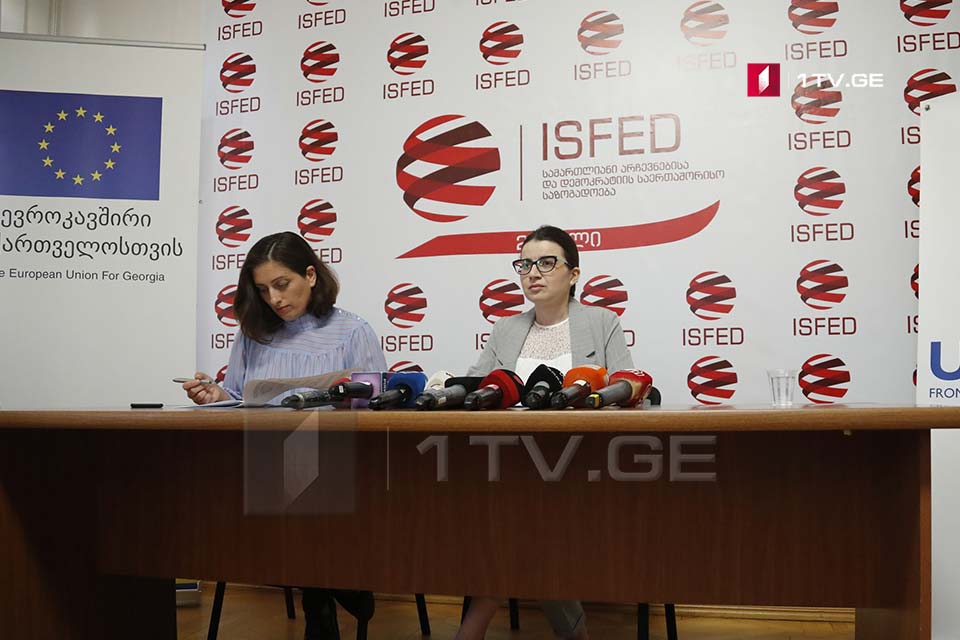
Elene Nizharadze, Executive Director of the International Society for Fair Elections and Democracy (ISFED), explains that invalid ballots were also counted and that “caused a small difference for three parties’ results.”
Nizharadze made this comment in an interview with the Georgian Public Broadcaster (GPB). According to her, an internal audit is a general standard for ISFED and the company conducts it for every observed election.
Consequently, these elections could be no exception, especially since they were very important elections.
“This audit is a very large-scale and multi-stage, and the data is double-checked. Let no one imagine that it takes one or two days. A thorough audit is conducted to rule out all possible flaws and to accurately identify the data. Recently, the Georgian Dream has been actively campaigning and trying to attract the attention and interest of the public to this issue.
This subject was manipulated the way that rose an impression in ISFED and me personally that they have been trying to make the public forget the problems discovered during the elections. I mean misbalance in the summary protocols, the revised summary protocols, the carousels we were talking about, the horrible standard of grievance redressal, and in general, the systemic problems that the public saw very well in this election. This topic has been completely ignored, moreover exaggerated as though the difference between our data and CEC data is very important and the most important problem in this election.
I would love to explain to the public that it is an extremely bad fact for our organization that our program encountered a similar defect and the invalid ballots were counted, but in reality, even keeping this in mind, this difference was so small that it didn’t affect the number of seats won by the parties, including the Georgian Dream. Georgian Dream knows this very well, I am sure they have counted this well,” Elene Nizharadze said.
She added the number of seats for all parties is the same, no matter whether the shortcomings are counted or not.
“This is the most important issue of interest for the citizens of Georgia. The number of mandates for the parties that secured their seats at the parliament does not change. We should have provided this information to the public so that it would not be misleading and distracting and giving ground for making the wrong accents because I think it is a very dishonest behavior and the public just does not deserve it. This was an attempt by the Georgian Dream to exaggerate this issue. Nor was it ever evidence of fraud. It does not affect the number of seats, and what does not affect the number of seats cannot be so significant, especially when it comes to some very small percentage discrepancy. When it comes to alleged fraud, it refers to the eight percent imbalances, the carousels, which was shocking, I think, for everyone.
I do not remember the carousel being proved. What happened in this election is astonishing, it was even more important than the eight percent imbalances found in the protocols, corrections, and so on.
We got the impression that the ruling party wanted to mislead the public and completely ignore and deliberately cover up the problems that are important to us,” Nizharadze said.
When asked a question if the gap was technical or methodological, Nizharadze said: “The methodology did not have any flaws, there was just an error in the program when the invalid ballots were also counted together with the valid ones. That’s what caused the difference between the three parties.”
She also commented on the meeting with the representatives of the Georgian Dream. “They were interested in PVT methodology. Of course, we are open to any side interested in the PVT or any other issue in our report or other issues our organization deals with. It is our commitment to meet everyone be that the ruling party, opposition, media, or any other interested party, we are ready to share the information. I met them personally, they had questions and we had a discussion.
The ruling party requested information on PVT precincts, where PVT methodology was applied, but we rejected the request. They requested this information but were denied not because they are the ruling party, but because this information is confidential. All others would have also received no be that media, other parties, NGO or even our partner GYLA,” Nizharadze said.
Addressing another issue being discussed whether there was any pressure from the representatives of the Georgian Dream, Nizharadze says: I would have provided the information if it had been so. No, there is no ground to talk about pressure, we had such a constructive meeting. They had questions, I answered, they may not have been satisfied and they wanted these precincts, but no one takes these precincts, I want to repeat, we cannot provide this information to anyone, because it is confidential, “Elene Nizharadze said.
According to the latest CEC data, Georgian Dream won 48,22% of votes. The PVT adjusted data provided by the Fair Elections yesterday, the maximum result received by the Georgian Dream made 48,3% and the minimum – 46,9%. Thus, the corrected results of the parallel counting of ISFED coincide with the final results of the CEC, taking into account the accuracy margin. It should be noted that according to the results of the parallel count published by the organization on November 1, the maximum result of the Georgian Dream was 46.5%, and the minimum – 45.1%.
By - Svetlana Alimova





